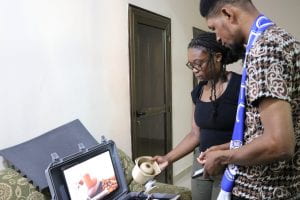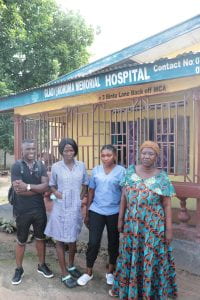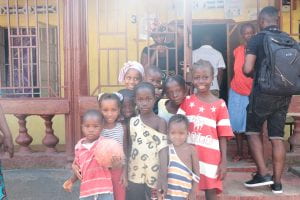
The Mothers of Sierra Leone team has arrived in Sierra Leone, fully prepared to fulfill our mission: to save lives through storytelling. As we begin our fieldwork journey, we will spend our time here establishing our goals and objectives with clarity, ensuring the successful realization of our mission within our limited time here.
In the preceding summer, the previous cohort concentrated on antenatal care. Building upon the footage they gathered, we were able to create compelling films highlighting vaccination, healthcare providers, and even promotional videos for clinics like Holy Spirit. This summer, our focus shifts to perinatal care – encompassing the well-being of both women and newborns before, during, and after childbirth. Join us as we endeavor to produce culturally sensitive films that resonate with our Sierra Leonean audience, while also embracing the opportunity to immerse ourselves in the country’s culture.
Today marked an important milestone as we finally had the chance to meet our Sierra Leonean partners at the World Hope International office. These individuals have been our collaborators whom we’ve connected with through WhatsApp since the previous semester. Among them is MSK, an indispensable member of our project who serves as our translator. MSK plays a pivotal role in facilitating communication during focus groups, transcribing interviews, and ensuring the overall success of our project. We took this opportunity to express our heartfelt gratitude for the substantial contributions he has made since the previous summer’s fieldwork.

Recognizing MSK’s integral role and our ongoing communication with him via WhatsApp and Google workspace, we have provided him with a laptop. This resource will enable him to conduct continuous research and keep us informed once our journey in Sierra Leone concludes. Our team members took the time to guide MSK through the laptop’s usage and how to access the downloaded content that will aid his work.
In anticipation of our arrival in Sierra Leone, we formed a partnership with a group of filmmakers in New York City who effectively utilized a solar-powered media kit to showcase their films abroad. With great enthusiasm, we now possess the same kit. We have also provided MSK with comprehensive instructions on its usage, as it will be a valuable tool for him to present our films to mothers during his research. We intend to have him conduct focus groups of mothers, fathers, and healthcare workers throughout the next 12 months. Additionally, we plan to have him conduct at least 100 surveys with mothers, fathers, and healthcare workers after screening our films with the cinema kit, which can be easily transported around Makeni with his motorbike.
Following our technology orientation with MSK, we engaged in discussions concerning his contract. This contract comprehensively outlines his responsibilities, tasks, and compensation, ensuring a mutual understanding of our collaboration’s framework.
 Next, we reconnected with Gladys Koroma Hospital, a hospital in Makeni that we have formed a relationship with. One of our team members was able to show the hospital staff a film we made about the services offered at the hospital. Although we were not able to gather much footage today, we made plans to come back later in the week to capture antenatal care day and conduct interviews.
Next, we reconnected with Gladys Koroma Hospital, a hospital in Makeni that we have formed a relationship with. One of our team members was able to show the hospital staff a film we made about the services offered at the hospital. Although we were not able to gather much footage today, we made plans to come back later in the week to capture antenatal care day and conduct interviews.
Following our meetings with some of our partners in Sierra Leone today, we are excited for the forthcoming phase of our project. In the upcoming days, we will focus on strategizing visits that align with partners’ schedules and objectives for collaboration.

You must be logged in to post a comment.